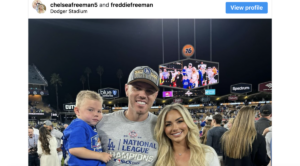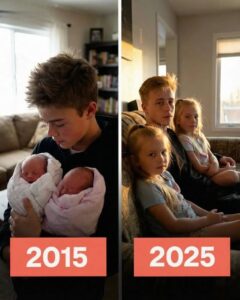I’m the only one who looks after my mom, Joyce, 79. After a bad fall, I made the hardest decision of my life.
I placed her in a nursing home because I was terrified she’d get hurt again when I was at work.
But I never abandoned her. Every weekend, I’d visit with fresh muffins, paint her nails, and decorate her room with photos.
But last Saturday, I walked in with banana bread and a cardigan—and the receptionist blinked.
“Mrs. Joyce? She’s not here anymore. She was discharged last week. A woman picked her up and said that…”
“…you had approved it.”
My heart dropped.
“What woman?” I asked, nearly breathless. “I didn’t approve anything. I’m her only daughter.”
The receptionist leaned in, clearly uncomfortable. “She said she was your sister. A Melissa…or Marlena?”
I felt my stomach churn. “You mean Marla?”
That name hadn’t come out of my mouth in six years.
Marla is my half-sister. Same dad, different moms. She dipped in and out of our lives like some flashy storm—pretty, chaotic, and never around long enough to clean up the mess she made.
She hadn’t spoken to Mom since their blowout over Dad’s inheritance.
So what the hell was she doing taking my mother out of a care facility like she suddenly cared?
I stood in that nursing home lobby, clutching the banana bread, suddenly unsure what to do.
I called Mom’s phone—straight to voicemail.
I called Marla—number disconnected.
I called the nursing home director, furious. How could they discharge a vulnerable elderly woman to someone not even listed on the emergency contact form?
Apparently, Marla showed up with a notarized document giving her temporary medical authority over Mom.
I didn’t even know that was possible without court approval.
And here’s the kicker—Mom didn’t object. She recognized Marla.
She even told the nurse she was “happy to spend time with her other daughter.”
Other daughter?
I couldn’t process the betrayal.
Not from Mom—but from Marla, who hadn’t lifted a finger when I was juggling doctor appointments, bills, and sleepless nights after Mom broke her hip.
I took two buses and a cab to find out Marla’s last known address.
Her place was in a fancier part of town—expensive condos, valet parking. No one there had seen her.
But the front desk clerk remembered an “older woman in a lavender coat” being helped into a car about five days earlier.
So I did what desperate people do.
I posted in a local Facebook group. A picture of Mom, a short caption:
“My elderly mother may have been taken without proper authorization. Please DM me if you’ve seen her with this woman.”
I didn’t expect anything.
But two days later, I got a message from a woman named Shireen.
She was a grocery store clerk in the next town over. She recognized my mom.
“She comes in with a woman—short, red hair, kind of bossy. They buy frozen meals, wine, and scratch-off tickets. I remember your mom because she complimented my necklace and told me about her cat.”
Mom hadn’t had a cat in ten years.
My gut told me something was off.
I thanked Shireen, asked for the store’s address, and went there that same afternoon.
I left notes on the bulletin board, at the register, even in the parking lot: “Missing senior. Please call if seen.”
That night, I got another message—from someone claiming to be Marla’s ex-boyfriend, Felix.
He saw my Facebook post and recognized her instantly.
He said Marla had “a pattern” of showing up when vulnerable people had something to gain—pensions, property, insurance.
He told me to check if Mom’s house had been touched.
I hadn’t been back to the house in weeks—just paid the utilities, let it sit.
I drove over the next morning.
Sure enough—the lock had been changed.
Through the front window, I could see the curtains were different, and a suitcase sat in the hallway.
I called the police.
I told them everything—about the unauthorized discharge, the forged paperwork, the missing senior.
But since Mom willingly left with Marla, and there were no signs of abuse, the officer said, “It’s a civil matter. You’ll need to go through the courts.”
I couldn’t believe it.
I wasn’t asking for custody—I just wanted to make sure my mom was safe.
I found an elder care attorney online. She was blunt, but kind.
She said I’d need to file for emergency guardianship and prove my mom was in danger—or being exploited.
I filed the papers that same week.
Three days later, a judge granted me a temporary order.
It gave me the right to locate Mom and bring her in for an evaluation.
But I still didn’t know where she was.
I went back to Shireen’s grocery store, waited for hours, hoping they’d return.
On day two, I saw them.
Marla, pushing the cart. Mom, in her lavender coat, smiling faintly.
I followed them outside, took a deep breath, and called out:
“Mom!”
She turned slowly. Her face lit up. “Darlin’! What are you doing here?”
Marla froze. Her smile didn’t quite reach her eyes.
“I could ask you the same,” I said. “You disappeared with her.”
“I rescued her,” Marla snapped. “You dumped her in that place.”
My jaw clenched. “She fell. I had no other choice.”
Mom looked between us, confused. “Girls, don’t fight…”
I took out the guardianship paperwork. “I have a court order, Marla. She’s coming with me—for now.”
Marla’s expression cracked for just a second.
Then she hissed, “Fine. But you’re going to regret this. She chose me.”
I didn’t answer. I was too focused on Mom, who looked tired and thinner than I remembered.
We got in the car. I brought her to the doctor.
Turns out she hadn’t been taking her meds properly.
She’d lost eight pounds.
The scratches on her arms were from neglected skin care—not a cat.
I showed the doctor the wine bottles I found in Marla’s apartment later—dozens of them, stashed under the sink.
She wasn’t helping Mom. She was using her.
The worst part? Mom didn’t even seem to realize.
She kept saying, “Your sister took me shopping. We had fun. We watched movies.”
It broke my heart.
Because all this time, I thought love meant protecting her.
But maybe, to her, love just meant being seen.
I could tell she missed the attention, the company—even if it came with a lie.
So I made a decision.
Once I got full guardianship, I didn’t put her back in the nursing home.
I cut back my hours.
I turned our guest room into her space—bought a recliner, a mini fridge, painted it yellow (her favorite color).
She was safe now. And more than that—she was home.
A month later, the court officially awarded me permanent guardianship.
And Marla? She was investigated for elder fraud.
Turns out, she’d convinced another cousin—an old veteran—to sign over his pension for “caretaking.”
He didn’t even remember doing it.
She skipped town once the investigation started.
I heard she tried to open a yoga studio in Arizona.
But karma has long arms.
And sometimes, it just takes a while to catch up.
As for me and Mom—we started going on little walks every morning.
We sit in the park, sip chamomile tea from travel mugs, and watch birds.
Sometimes she gets confused and asks about people who aren’t alive anymore.
Sometimes she holds my hand like she’s afraid I’ll leave.
I never do.
I learned that showing up isn’t always enough.
You have to be present.
You have to let them feel important.
Because even strong love can be overshadowed if it starts to feel like duty instead of devotion.
So now, I still paint her nails. I still bring her muffins.
But I also let her tell the same stories. I laugh at the same jokes.
I stopped rushing the moments.
Because eventually, there won’t be any more.
And when that day comes, I want to know I gave her something no scammer ever could—dignity, stability, and the kind of love that doesn’t need an audience.
If you’ve ever taken care of someone you love, you know how heavy it can get.
But also how sacred.
I hope this reminds someone out there—it’s okay to be tired, but it’s never okay to stop seeing the people we care for.
They don’t need perfection.
They need presence.
💛 Share this if you’ve ever cared for a parent, a grandparent, or someone vulnerable. You never know who needs the reminder.
Like if you believe love is shown in small, consistent actions




